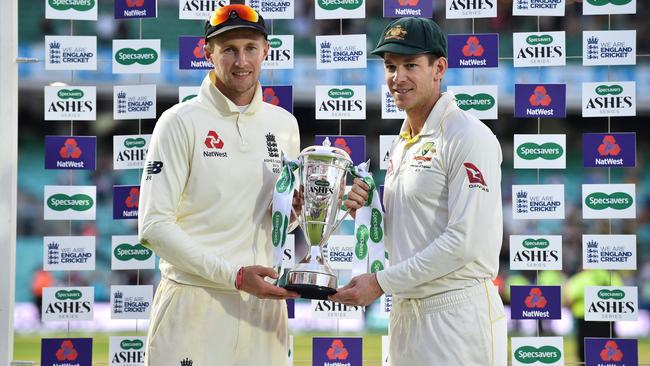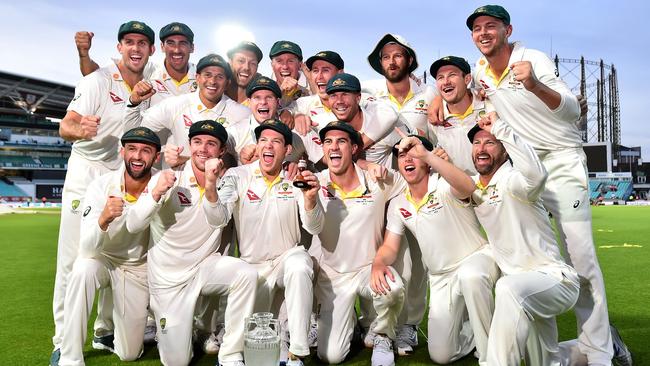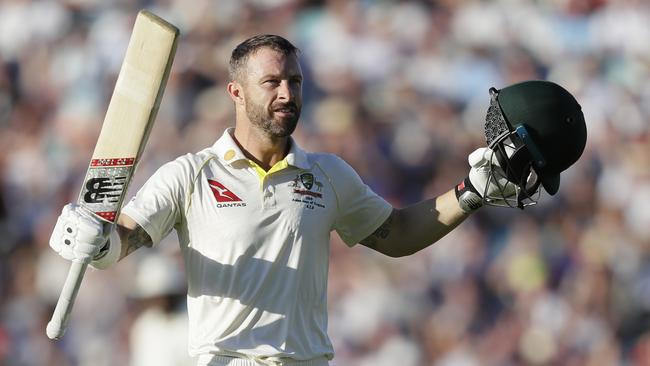Ashes series that was in advance too close to call has proven just that

In a way, Australia’s advantage of custody of the Ashes cancelled out England’s of home conditions. Australia were deprived of Steve Smith at a crucial juncture, England of James Anderson throughout. Neither captain had a great series professionally; both can claim to have learned personally and pastorally. Speaking to the media last night, Tim Paine and Joe Root looked disarmingly cheerful, relieved at last, at least momentarily, of the cycle of chagrin about the previous day, dread of the next.
MORE: Wade ton fails to halt England win — How the day unfolded
This final afternoon was England’s. Their cricket had a solid Test match tempo, with Stuart Broad superb, Jofra Archer spectacular, and Jack Leach understatedly probing. Root called it a “blueprint’’ for how he would like England to play. A strange time to produce it, when the house is complete, but better late than never.
The Australians picked a bad day to have in some ways their worst of summer, disconcertingly limp in conditions that held few dangers, let alone terrors. This may be the best Test that Travis Head has ever had; nor would it have discouraged the like of Joe Burns, Kurtis Patterson, Will Puckovski, Matthew Renshaw and Jake Weatherald, or, indeed, Usman Khawaja, who it’s hard to argue is Marcus Harris’s inferior.
Australia’s problems began when Harris’s porous defence was penetrated again. He has done nothing to build on favourable impressions made at home. His coach’s early assessment of him as being “mediocre with flashes of brilliance’’ has been belied by the lack of the latter.

The last eclipse of Warner, who strutted and fretted his way to double figures, then resembled a prisoner facing a firing squad scorning a blindfold. He played and missed with a self-conscious indifference, pelted back for a second off Broad as if eager to get to grips with his nemesis, and soon enough succumbed to another hard-handed push at Broad, nicely taken at second slip. On the replay, his defence could be seen gaping like every photograph of Nigel Farage’s mouth.
Walking in, Warner bore a patient, long-suffering look. For a batsman so thoroughly pwned, he has not dropped his bundle. As a team member, it would be hard to fault his on-tour demeanour. There will also be no Broad when Australia play their next Test in Brisbane, and probably a welcomingly flat pitch. But Warner will by then be 33, and the aura around his batting, once palpable, is a dwindling memory.
Smith had time for one remarkable back foot drive from Broad to the fence, all along the ground to mid-on’s left — a look away handpass of a shot, a sleight of eye and wrist. Broad cast a quizzical look at umpire Marais Erasmus, as if questioning the stroke’s legality.
Just after 2pm, however, Smith turned Broad off his ribs to leg slip, where he has picked up scores of runs this series, and where teams have periodically probed him. The winning lotto numbers in SteveSmithomillions were thus, finally, 774 at 110, a deferential 200 runs in arrears of Bradman’s 1930 record, not to mention a dozen catches, routinely brilliant. He was warmly applauded by fans whose countrymen received him so gratingly four and a half months ago — part generosity, part relief.

That opened both ends, rather than just one. Marnus Labuschagne could not continue his good run, Mitchell Marsh not end his bad one, Tim Paine not break from his middling rut, and the tail was docked easily. Between times, Matthew Wade enjoyed the freedom of a lost cause, batting breezily for almost four and a half hours, nearly holing out a couple of times and taking risks in driving out of the rough but hitting more than two-thirds of his runs in crisp boundaries including a peachy six from Archer.
As he peeled off easeful hundreds on Australia A’s tour of England in June, teammates were speaking of Wade with a vague sense of awe. There was talk that his batting had reached the “next level’’. Some even jokingly referred to him as “the Don’’.
It has not turned out that way. Since a second-innings century at Edgbaston, Wade has been more audible than visible, providing for stump mic a soundtrack of more or less constant inanities, even annoying Ian Chappell, which takes some doing. For the Don, there has been another, more obvious, proxy.
This 117 was the kind of counterpunching innings against the softening ball for which Australia chose him. Wade emerged well from a fierce spell by Archer, used his feet effectively to spin. It is less clear what the achievement actually established: few remember the two hundreds Marcus North scored here ten years ago. But Australia badly need a batting line-up worthy of their virile fast bowling.
The caravan moves on quickly. Both teams start their next Tests in 67 days, on 21 November: England will be visiting New Zealand at Mt Manganui, Australia hosting Pakistan at the Gabba. Between times they will turn this series over in their minds, wondering how it might have been different, stuck with a verdict that will remain the same, pleased one day, disappointed the next, but eventually, one hopes, satisfied.



So it’s official. The Ashes series that was in advance too close to call has proven just that. Perhaps neither team was quite good enough to pull away and win decisively; both can claim to have deserved better than to lose. Much as it might gall patriots, a drawn series suits the relative concentrations of talent and the apportionment of luck on each side. No need for a super over or boundary count to separate them.